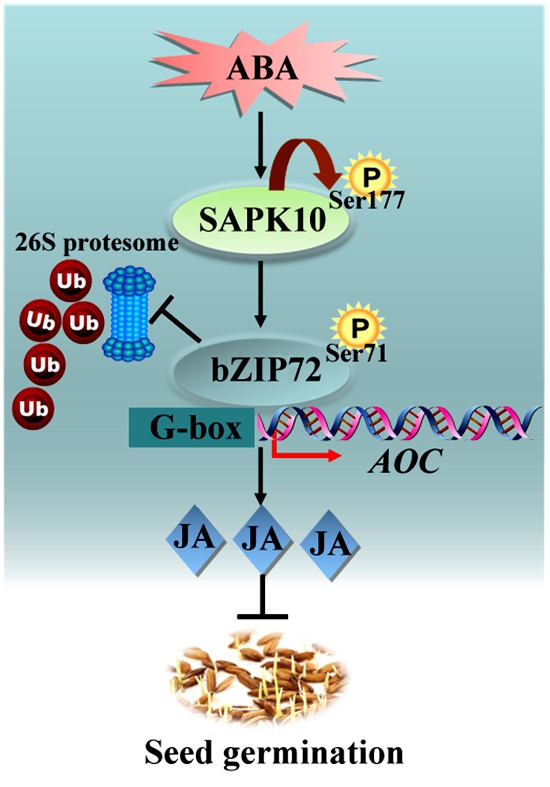Abscisic Acid Promotes Jasmonic Acid Biosynthesis via a SAPK10-bZIP72-AOC Pathway to Synergistically Inhibit Seed Germination in Rice (Oryza Sativa)
In south China, high temperature and frequent rainfall usually cause pre-harvest sprouting, which ultimately lead to losses of grain yield and quality. Both rice quality and pre-harvest sprouting tolerance are directly influenced by germination behavior of rice seed. Unveiling genetic attributes and molecular network of seed germination sheds light on improving pre-harvest sprouting tolerance.
Seed germination is regulated by both external environment factors and plant endogenous hormones. The latter factor, hormone biology in seeds, has always been a current issue of seed research. Previous efforts mainly concentrated on antagonistic effects of abscisic acid (ABA) and gibberellin (GA). In recent years, studies indicate that jasmonic acid (JA) is another vital regulator of seed germination. However, the interaction between JA and ABA in seed germination and its underlining molecular network remain unclear.
Based on the above background, researchers from China National Rice Research Institute (CNRRI) studied the interaction between JA and ABA. Based on the results, a SAPK10-bZIP72-AOC pathway through which ABA promotes JA biosynthesis to synergistically inhibit rice seed germination was reported. Researchers showed that SAPK10, an ABA-inducible SnRK2 type kinase in rice, exhibits auto-phosphorylation activity on the 177th serine, which enables it to phosphorylate a bZIP transcription factor bZIP72 majorly on 71st serine. Further investigation suggested that the SAPK10-dependent phosphorylation enhances bZIP72 protein stability as well as the DNA binding ability to the G-box cis-element of JA biosynthesis gene AOC promoter, thereby elevates the AOC transcription and the endogenous level of JA. In addition, blocking of JA biosynthesis significantly alleviates the ABA sensitivity on seed germination.
Supported by National Natural Science Foundation of China (Grant No. 31401366, 31701395 and 31871229), ASTIP program of CAAS, and the Chinese High-yielding Rice Transgenic Program (Grant No. 2016ZX08001004-001), this work entitled Abscisic Acid Promotes Jasmonic Acid Biosynthesis via a SAPK10-bZIP72-AOC Pathway to Synergistically Inhibit Seed Germination in Rice (Oryza sativa) was published online in New Phytologist.

The paper can be accessed through the link below:
http://nph.onlinelibrary.wiley.com/doi/10.1111/nph.16774
By Shen Huizhi (shenhuizhi@caas.cn)
-
 Apr 18, 2024Opening Ceremony of the Training Workshop on Wheat Head Scab Resistance Breeding and Pest Control in Africa Held in CAAS
Apr 18, 2024Opening Ceremony of the Training Workshop on Wheat Head Scab Resistance Breeding and Pest Control in Africa Held in CAAS -
 Apr 03, 2024IPPCAAS Co-organized the Training Workshop on Management and Application of Biopesticides in Nepal
Apr 03, 2024IPPCAAS Co-organized the Training Workshop on Management and Application of Biopesticides in Nepal -
 Mar 28, 2024Delegation from the School of Agriculture and Food Science of University College Dublin, Ireland Visit to IAS, CAAS
Mar 28, 2024Delegation from the School of Agriculture and Food Science of University College Dublin, Ireland Visit to IAS, CAAS -
 Mar 25, 2024Director of World Food Prize Foundation visited GSCAAS
Mar 25, 2024Director of World Food Prize Foundation visited GSCAAS -
 Mar 20, 2024Institute of Crop Sciences (ICS) and Syngenta Group Global Seeds Advance Collaborative Research in the Seed Industry
Mar 20, 2024Institute of Crop Sciences (ICS) and Syngenta Group Global Seeds Advance Collaborative Research in the Seed Industry
